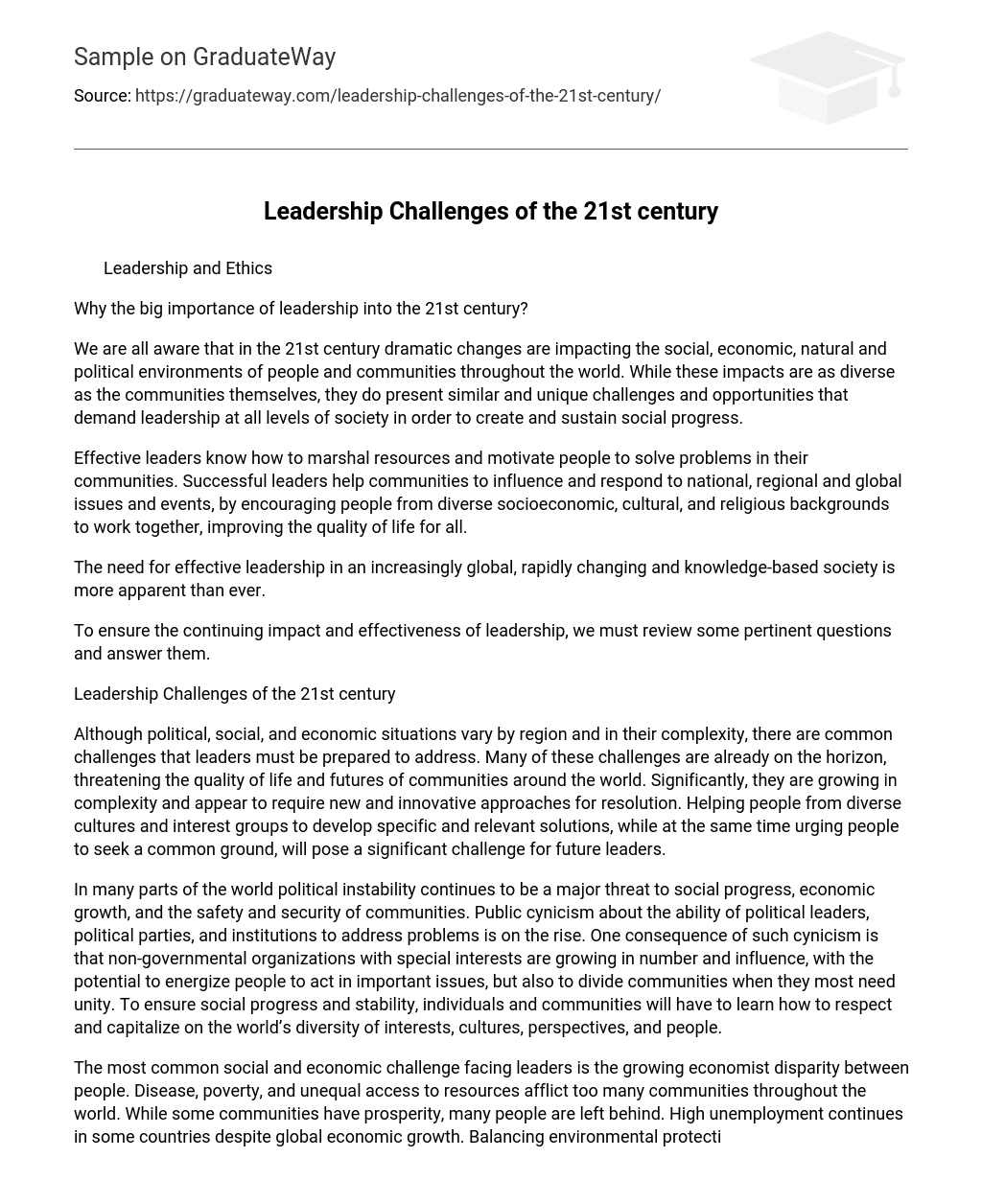Leadership and Ethics
Why the big importance of leadership into the 21st century?
We are all aware that in the 21st century dramatic changes are impacting the social, economic, natural and political environments of people and communities throughout the world. While these impacts are as diverse as the communities themselves, they do present similar and unique challenges and opportunities that demand leadership at all levels of society in order to create and sustain social progress.
Effective leaders know how to marshal resources and motivate people to solve problems in their communities. Successful leaders help communities to influence and respond to national, regional and global issues and events, by encouraging people from diverse socioeconomic, cultural, and religious backgrounds to work together, improving the quality of life for all.
The need for effective leadership in an increasingly global, rapidly changing and knowledge-based society is more apparent than ever.
To ensure the continuing impact and effectiveness of leadership, we must review some pertinent questions and answer them.
Leadership Challenges of the 21st century
Although political, social, and economic situations vary by region and in their complexity, there are common challenges that leaders must be prepared to address. Many of these challenges are already on the horizon, threatening the quality of life and futures of communities around the world. Significantly, they are growing in complexity and appear to require new and innovative approaches for resolution. Helping people from diverse cultures and interest groups to develop specific and relevant solutions, while at the same time urging people to seek a common ground, will pose a significant challenge for future leaders.
In many parts of the world political instability continues to be a major threat to social progress, economic growth, and the safety and security of communities. Public cynicism about the ability of political leaders, political parties, and institutions to address problems is on the rise. One consequence of such cynicism is that non-governmental organizations with special interests are growing in number and influence, with the potential to energize people to act in important issues, but also to divide communities when they most need unity. To ensure social progress and stability, individuals and communities will have to learn how to respect and capitalize on the world’s diversity of interests, cultures, perspectives, and people.
The most common social and economic challenge facing leaders is the growing economist disparity between people. Disease, poverty, and unequal access to resources afflict too many communities throughout the world. While some communities have prosperity, many people are left behind. High unemployment continues in some countries despite global economic growth. Balancing environmental protection with sound economic growth will continue to be a challenge.
Other challenges are drug abuse, crime, discrimination and stereotyping on women, youth and ethnic minorities. The leaders will be challenged to find ways to help these groups become more effectively engaged.
Why is leadership so important?
Leadership development is vital because organizations take on the personality of their leaders. Leadership training and development can maximize productivity, shape a positive culture and promote harmony. To achieve this, key people must lead individuals and teams using an appropriate leadership style.
Leadership skills and how they can help you?
Leadership is never easy. No matter how effortlessly some leaders appear to manage, the path of a leader is one fraught with constant challenge and surprise. However, the leader does not face the challenge alone. By definition, a leader has a group or organization working to meet each challenge and achieve each goal. The leader’s job is not to solve every problem alone, but to inspire those he or she leads to solve the problems. Good leaders recognize that they do not have all the answers and are constantly reeducating themselves on their businesses and sharpening their leadership skills. Beyond personal qualities such as vision and positive thought, a leader must also take careful steps to communicate with his or her staff in the best way possible. Formerly rare processes such as goal-setting, constant feedback and a system of rewards are now the norm in most workplaces.
The worst leadership mistakes
Although leaders have skills that are helping them to face the challenges and achieve every goal, they also should know how to face their mistakes and resolve them. Here are some mistakes in leadership:
Don’t overestimate yourself. If you go into a leadership situation thinking you’re prepared for and capable of handling any and every situation, think twice. A modest amount of egotism is inherent in any leader, but a true leader also recognizes the fact that she or he will learn as much from her/his team as her/his team will learn from her/his. If a new leader, you may find yourself in a situation where you are expected to manage a team that has been allowed to become lethargic—in other words, a team that is not used to being led by an effective manager. Or, you may have an ideal team except for one problem employee. One bad apple may not spoil the whole bunch, but can go a long way toward derailing the goals of the whole bunch. Last, the new leader may let his lack of management experience show by over-reacting or letting his team see that they are capable of playing on his weaknesses. Whatever the case, there will be bumps along the road for any manager or leader. Why? Because managing humans is much harder than managing the most sophisticated computers. Humans are complicated, diverse, and imperfect. While those diversities and imperfections are often things to be celebrated, they provide unlimited opportunities for friction.
A good leader should be a psychologist, to predict situations and risks; to be prepared for everything no matter is it good or bad, with other words to have before prepared plans for resolving every kind of situations that concern the team and the leader her/himself about achieving the goal.





